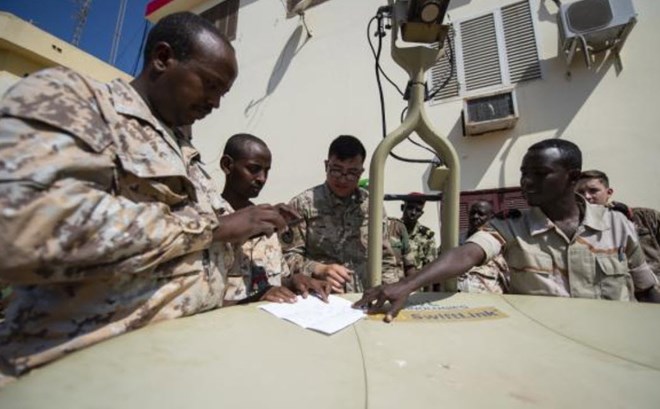Talk Media News
Tuesday April 16, 2019
By Tom Squitieri

WASHINGTON — The nation where events turned the U.S. against humanitarian military intervention — Somalia — has become the newest front for escalation by the Pentagon.
What was to be a one-year training mission for local forces battling al-Qaeda is about to enter its third year after President Donald Trump signed an executive order extending a presidential declaration of a national emergency concerning Somalia for another year.
The declaration should not “change the scope or what we are doing in support of the Somalian government,” one Pentagon official told TMN Monday, other than an increase in air strikes.
Between 500 and 600 U.S. service personnel are in Somalia as part of an international coalition battling Al-Shabaab, an offshoot of al-Qaeda, the Pentagon official said.
Pentagon officials have previously described the U.S. military role in Somalia as advising on strategy, coordinating and carrying out air strikes. They also said a Navy SEAL-led Special Forces embedded with Somalian army forces to assist in developing a 3,000-strong homegrown elite light infantry outfit.
The rise in air strikes and focus on Somalia comes as the Pentagon winds down operations against ISIS in eastern Syria. It also comes as Trump continues to pressure the Pentagon to reduce — if not eliminate — the U.S. military operation in Afghanistan.
Somalia’s capital, Mogadishu, was the site of the battle depicted in the movie “Black Hawk Down,” in which two U.S. Black Hawk helicopters were shot down in October 1993 and 18 U.S. and two U.N. soldiers were killed. Some U.S. troops’ bodies were dragged through the streets of Mogadishu.
At the time, the United States was spearheading a U.N. mission to end the civil war and famine in Somalia; however, the helicopters were part of a mission to capture top allies of Somali warlord, Gen. Mohamed Farah Aideed.
Six months after that, all U.S. troops were out of Somalia and Washington retreated from intervening in African crises — a key reason it eschewed any thoughts of trying to stop the Rwandan genocide in 1994.
Trump renewed the designation over the weekend, calling the Islamist terrorism in Somalia an “unusual and extraordinary threat” to the United States.
According to U.S. Africa Command in March, there have been 110 airstrikes in Somalia since June 2017. News releases announcing the airstrikes contain the sentence, “At this time, it is assessed no civilians were injured or killed in this airstrike.”
However, on March 10, Amnesty International released a report charging that eight AFRICOM airstrikes in 2017 and 2018 resulted in civilian casualties. The group said it had “credible evidence” that 14 civilians were killed and eight injured in the strikes.
The Pentagon disputed the findings. In a statement released in March, it said, “Our assessments found that no AFRICOM airstrike resulted in any civilian casualty or injury. Our assessments are based on post-strike analysis using intelligence methods not available to non-military organizations.”